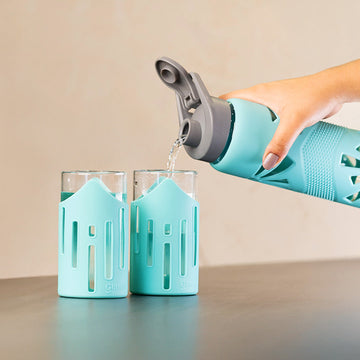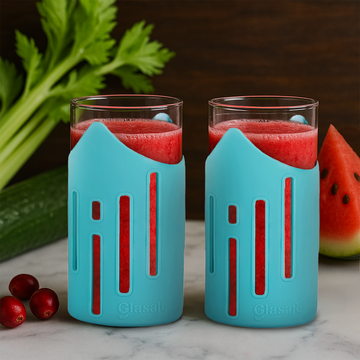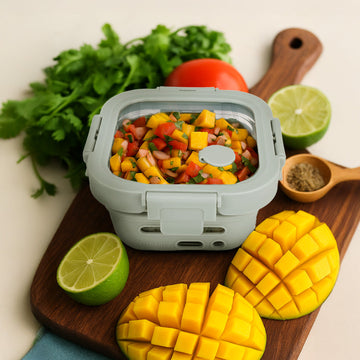How much water should a person drink every day? That’s the question that every person has on their mind. We have all heard that the ideal amount of water a single person should drink every day is 8-10 glasses. But is it correct for everyone? How much you should drink is more individualized than you might think.
Amid detox drinks, lemon water, and viral hydration hacks, the simple truth about daily water intake often gets lost. In this blog, we break down the truth behind daily water requirements, signs of dehydration, and smart hydration tips to keep your body and mind in excellent condition.
How Much Water Should You Actually Drink Every Day?
The classic 8 glasses per day is the old-school guideline that is almost equal to 2 litres per day. But, not a one-size-fits-all. It’s a great target to achieve for those who drink very little water. However, the truth is, your ideal water intake might be higher or lower depending on several personal factors, including:
-
Your Height and Weight: The larger your body mass, the more water it needs to function efficiently. A taller or heavier person naturally requires more water than someone smaller.
-
A good thumb rule is to drink 30-35 ml of water per kg of body weight. For instance: If you weigh 60 kg → 60 × 35 = 2,100 ml or about 2.1 litres/day
-
Your Daily Activity: Are you a gym-goer, dancer, cyclist, or someone who’s constantly on their feet? When you sweat, you lose water and essential electrolytes. The more active you are, the more water your body needs to replenish lost fluids and keep your muscles functioning properly. The pro tip is to drink water before, during, and after your workouts to stay ahead of dehydration.
-
Your Climatic Condition: Living in a hot, humid, or dry climate? Your daily water intake needs go up significantly. In warmer regions or during peak summer, your body sweats more to cool down, which means that you need to hydrate yourself more frequently.
-
Using AC or Heaters: Even air conditioning or heaters can dry out your skin and body, silently increasing your fluid requirements, so make sure you hydrate well throughout the day.
-
Your Diet: Fruits and vegetables like watermelon, cucumber, oranges, spinach, and tomatoes are packed with water. If your diet includes a lot of these, your hydration needs might slightly decrease. On the other hand, diets high in protein, fiber, or sodium may require you to drink more water to support digestion and balance. Make sure to consume a well-balanced meal to ensure you get all the nutrients and hit your water target correctly.
-
Your Overall Health: Certain health conditions can increase your water needs. For example, fever, diarrhea, or vomiting causes fluid loss. Kidney stones or urinary tract infections (UTIs) need extra hydration, while pregnancy or breastfeeding increases demand for fluids to support both mother and baby.
It is best to take advice from your doctor and know the specific water intake depending on your medication or condition.
Which Food Item Keeps You Hydrated?
Several food items are excellent for staying hydrated due to their high water content. Food items like cucumbers, watermelons, and lettuce are among the most hydrating options, with watermelons boasting a 92% water content. Other good choices include strawberries, oranges, and celery.
Here's a more detailed look at some of these hydrating foods:
-
Cucumbers: It has approximately 95% water, making them a great source of hydration.
-
Watermelon: It contains around 92% water, providing a refreshing and hydrating snack.
-
Lettuce: Especially iceberg lettuce, which has about 96% water content.
-
Strawberries: Around 91% water, a sweet and tasty hydrating option.
-
Oranges: About 88% water, a good source of hydration, and Vitamin C.
-
Celery: A surprising 95% water, making it a good choice for hydration.
-
Broccoli: It contains around 90% water.
Do Beverages Count Towards Daily Water Intake?
Drinks do count toward daily water intake, but you need to find the healthier ones to get enough fluids throughout the day. People aim to drink about 8-10 glasses throughout the day, but this might not be possible for some. So, to ensure you are well hydrated, we are sharing a few beverage options as well as tips that might help you drink more water.
Do’s
-
Swap sugary drinks for diet, sugar-free, or no-added-sugar drinks.
-
Adults can choose lower-fat milk, such as semi-skimmed, 1% fat, or skimmed milk, and unsweetened plant-based drinks.
-
Limit fruit juice and smoothies to a maximum of one glass a day and drink with a meal, as they're high in sugar.
-
Check nutrition labels on drinks – look for drinks with green or amber colour-coded labels.
-
Drink extra fluids if you have been sweating from workouts, or if you're unwell – water is the best way to replace lost fluids.
-
Dilute squash drinks or cordials well to reduce the sugar content.
-
Drink caffeine in moderation – some people are more sensitive to caffeine than others, depending on how much they drink and how often. Check the label for drinks that are high in caffeine.
-
If you don't like the taste of water, try sparkling water, no added sugar squash, or add a slice of lemon or lime with a drizzle of honey.
Don’t
-
Avoid drinks that are high in sugar content too often because they are higher in calories, and the sugar can damage your teeth.
-
Do not have more than 200mg of caffeine a day if you are pregnant. This could increase the risk of miscarriage or low birth weight.
Best Times to Drink Water Throughout the Day
According to research, the best times to drink water are upon waking, before meals, before and during exercise, and before bed. Let’s know more about this in detail.
-
Morning: Rehydrating the body after sleep can be achieved by consuming a glass of water as soon as you wake up.
-
Before Meals: Thirty minutes before to meals, drinking water might help you feel fuller and possibly prevent overeating. Water consumption throughout meals can help with digestion.
-
Before, during, and after exercise: Drink water before, during, and after workouts since proper hydration is essential for physical activity.
-
Before bed: Water consumption before bed might help avoid bad breath and dry mouth. However, certain people should modify their water consumption earlier in the evening since they may have nocturia, which is frequent urination at night.
Signs You’re Not Drinking Enough Water
In infants or young kids:
-
Urinating less than usual or no wet diapers for three hours.
-
Dry mouth.
-
No tears when crying.
-
Rapid heart rate.
-
Sunken eyes, cheeks, or a soft spot on top of the skull.
-
Lacking energy or being cranky.
-
Skin that doesn't flatten back right away after being pinched.
In adults:
-
Extreme thirst.
-
Urinating less.
-
Dark-colored urine.
-
Tiredness.
-
Dizziness.
-
Being confused.
-
Skin that doesn't flatten back right away after being pinched.
-
Sunken eyes or cheeks.
Hydration Tips to Help You Drink More Water Daily
-
Flavor it: Add fruit to your water. Lemons, limes, and oranges are tried and true. Cucumber, watermelon, strawberry, and herbs are also delicious options.
-
Tie it into a routine: Drink a glass of water every time you brush your teeth, eat a meal, or use the bathroom.
-
Eat it: Many fruits and vegetables have a high water content, including melon, cucumbers, lettuce, and celery.
-
Track it: Invest in a high-tech bottle that connects to your smartphone and records how much you drink. Or set an alarm as a reminder and track your intake in your calendar.
-
Challenge a friend: Kick off a healthy competition with a friend or your kids to see who can meet their guzzling goal most often.
-
Take it to go: Drinking enough water when you are on the go can be challenging. Fill your water bottle before you leave home, and bring it along on your daily travels.
-
Alternate your drinks: If you can't give up soda or juice completely, try alternating with water. Each time you finish a glass of water, switch to soda or juice and vice versa.
Benefits of Drinking Sufficient Water
Water is your body's principal chemical component and makes up about 50% to 70% of your body weight. Your body depends on water to survive.
Every cell, tissue, and organ in your body needs water to work properly.
-
Drinking enough water ensures your body gets rid of wastes through urination, perspiration, and bowel movements
-
It keeps your temperature normal and prevents dehydration, especially during summer.
-
Regular and consistent intake of water lubricates and cushions joints.
-
It protects sensitive tissues and ligaments.
-
Lack of water can lead to dehydration — a condition that occurs when you don't have enough water in your body to carry out normal functions. Even mild dehydration can drain your energy and make you tired.
Should I Worry About Drinking Too Much Water?
Healthy adults rarely have an issue with excessive water intake. However, too much water can affect your brain cells, resulting in swelling or low sodium levels. You might feel tired or become distracted if you are a little overhydrated.
Overhydration can lead to water toxicity, intoxication, or water poisoning if you consume large amounts of water in a short amount of time. This occurs when cells, particularly brain cells, enlarge due to an excess of water in them. You can begin to experience headaches, sleepiness, and disorientation. Conditions like bradycardia (low heart rate) and hypertension (high blood pressure) could result from an increase in this pressure.
The electrolyte primarily impacted by dehydration is sodium. Your body uses electrolytes, which can be positively or negatively charged, to help balance the fluid content of your cells. Hyponatremia may result from fluids entering the cells when sodium levels fall as a result of the body having too much water. You may get convulsions, enter a coma, or even pass away as a result of your cells swelling. You can be at risk of developing hyponatremia if your blood sodium level drops below 135 mEq/L. The normal range is 135 milliequivalents per liter (mEq/L) to 145 mEq/L.

FAQs
Is 2 liters of water a day enough?
Yes, two liters (about eight glasses) of water a day is a good general rule of thumb for many people. Your precise requirements, however, might change based on your diet, exercise level, weight, and climate. Some people might need more, particularly if they exercise frequently or it's hot outside.
How much water should I drink based on weight?
30 to 35 milliliters of water per kilogram of body weight is a clever formula.
For instance:
Aim for 1.8 to 2.1 liters per day if you weigh 60 kg.
Aim for 2.1 to 2.5 liters per day if you weigh 70 kg.
Is 4 liters of water a day too much?
It varies. Four liters can be the ideal amount for someone who is highly active or lives in a hot region. However, it could be too much for a sedentary person, resulting in hyponatremia or water intoxication. Always balance what you eat with what your body tells you.
Is 500 ml of water a day enough?
No, 500 milliliters, or half a liter, is significantly less than what is needed. Dehydration, exhaustion, headaches, and digestive problems may result from this. Depending on several variables, most adults require at least 1.5 to 3 liters per day.
Can I drink 5 litres of water a day?
Not advised for the majority of people. Drinking five liters or more a day might cause electrolyte imbalance and renal strain. Consume this much only if directed by a physician or if you are in extremely hot or muggy physical situations, such as sports or outdoor work.
Is it okay to only drink 1 litre of water a day?
One liter is insufficient for the majority of adults. Mild to moderate dehydration could result from it. For proper digestion, circulation, skin health, and even mood control, your body requires more water. At least 1.5 to 2.5 liters should be your goal, depending on your exercise level and body weight.
How much water should a 70 kg person drink per day?
employing the usual hydration formula, which is 70 kg × 30–35 ml = 2.1–2.45 liters of water per day.
If you exercise, sweat more, or live in a warmer climate, this may change.
Is 3 litres of water a day too much?
Not always. Three liters a day is normally safe and advantageous, particularly if you live in a hot climate or are physically active. Just spread it out throughout the day rather than drinking it all at once.
What is the healthiest water to drink?
Water that is the healthiest is:
-
Water that has been filtered or purified (removing dangerous impurities)
-
Water that is mineral-rich (natural spring or RO with minerals added)
-
Kept in glass or BPA-free, secure containers
Avoid water that smells strange, tastes metallic, or has dubious origins.
How to drink water correctly in a day?
The following are the guidelines for drinking water properly:
-
Drink a glass as you wake up and throughout the day, rather than in one big gulp.
-
Drink water half an hour before eating.
-
Drink plenty of water before, during, and after physical activity.
-
Refrain from consuming large amounts of water right after eating.
Why do I feel hot after drinking water?
You might feel heated because of:
-
The water's temperature (warm or hot)
-
Increased blood flow as a result of drinking more water
-
Stimulation of the digestive system, particularly with warm water
Is RO water good for health?
Reverse osmosis (RO) water is beneficial to health if:
-
The water is remineralized after purification.
-
It is kept in secure containers.
-
Select systems that replenish calcium and magnesium because pure RO water may be deficient in these vital elements.
Is boiled water safe to drink?
Indeed. Most bacteria, viruses, and parasites are eliminated when water is brought to a boil, making it safe to consume, particularly in contaminated or unreliable situations.
What are the top 5 best drinking waters?
The top five varieties of drinking water are as follows:
-
Spring Water – natural and mineral-rich
-
Mineral Water – sourced from natural springs with added health minerals
-
RO Purified Water – safe and filtered
-
Alkaline Water – claimed to neutralize acidity (still under debate)
-
Boiled Water – safest during emergencies
How healthy is drinking boiled water?
In the short term, boiling water is very safe and healthful, especially when it comes to eliminating microorganisms. It does not, however, eliminate heavy metals or other chemical pollutants like chlorine. When you're uncertain about the quality of the water, it's perfect.
How to purify water at home?
Among the efficient house purifying techniques are:
-
Boiling destroys viruses and germs.
-
RO purifiers, which eliminate pollutants and heavy metals
-
UV filters (use ultraviolet light to sanitize water)
-
Activated carbon filters eliminate taste, chlorine, and odor contaminants.
Is tap water safe to drink?
Each locale has different tap water. Tap water in many Indian cities may include microorganisms, heavy metals, or chlorine. Before drinking, tap water should be boiled or filtered for safety.
What chemical is in water?
H₂O, or hydrogen and oxygen, combine to form water. Only three components are present in pure water, but most drinking water also contains trace minerals, including calcium, magnesium, and occasionally fluoride or chlorine, depending on the source. In moderation, they may be helpful, but it's crucial to consume pure, filtered water free of dangerous impurities.
What kind of water should I drink every day?
Drink mineral-rich, safe, and pure water daily. Remineralized RO water, mineral water, or filtered tap water are all excellent choices. Select neutral-pH water and keep it in BPA-free glass bottles. Always make sure the water is adequately cleansed and stay away from dangerous chemicals.





